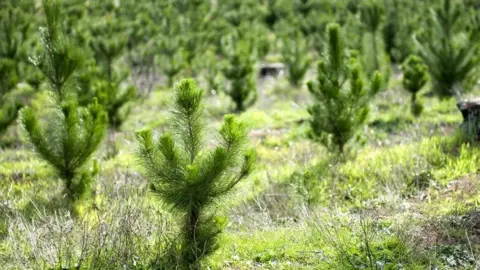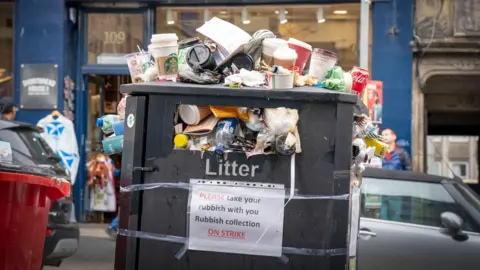Nature funding to be used to settle council pay deals
 Getty Images
Getty ImagesMoney set aside for restoring nature is to be diverted into funding wage settlements in Scotland’s local authorities.
BBC Scotland News understands that ministers have written to councils telling them to divert the current year’s allocations from the Nature Restoration Fund to settle pay deals.
The fund is worth £29.2m although the cash is split between councils and the Scottish government’s nature agency Nature Scot.
The Scottish government said £5m was being redirected to fund the pay offer but added that it would be replaced in future years.
The Nature Restoration Fund is used to pay for local projects to tackle the nature emergency, ranging from tree planting to restoring waterways.
It is estimated that one in nine species in Scotland is under threat of extinction because of long-term habitat loss and ministers have said restoring biodiversity is “crucial” in tackling the climate crisis.
Last week Finance Secretary Shona Robison said that spending constraints were “unavoidable” because of the “spending challenges” being faced.
'Desperately bad news'
Lang Banks, director of WWF Scotland, said: “It's extremely frustrating when the small amounts of money which are allocated to climate and nature action come under further pressure.
"Scotland is one of the most nature-depleted countries in the world, and it's really important that we take steps now in order to begin to reverse that.
"Many of the actions that you can take to protect nature also deliver benefits for the public, whether by cutting carbon, cleaner air or helping to reduce flooding.
"So pulling money from this area is just storing up problems for the future."
Mark Ruskell, the Scottish Greens' environment spokesman, told BBC Scotland News: "We're in a climate and nature emergency.
"The two crises are interlinked. So if money gets pulled away, for example, from wetland creation, it's going to make communities more vulnerable to flooding downstream.
"So we have to invest for the long term. I think any shift away from that funding is incredibly damaging."
He added: "We came out of the Covid crisis in love with nature, in love with our communities, and of course many nature restoration funds have built on that success.
"This is a fund that is about communities working with councils to restore woodlands, to restore wetlands to improve access.
"We won't solve that cost of living crisis by cutting relatively tiny amounts of money that are needed to support communities and tackle the climate and nature emergency."
 PA Media
PA MediaAnne McCall, director of RSPB Scotland, said: “This is desperately bad news.
"Recently published analysis has shown that funding for nature needs to increase, not be cut. Scotland is one of the most nature depleted countries in the world, coming 28th from the bottom of 240, and this trend is continuing.
“The Nature Restoration Fund has been critical in helping to deliver projects right across rural and urban Scotland, generating employment and bringing benefits to people, economy, biodiversity and nature."
She added: "The short and long-term consequences of this action will be keenly felt both now and into the future."
She said repeated surveys had shown that the Scottish public wanted nature restoration to be given more prominence in government decision-making.
"Yet they are once again being sold short and having to settle for choices which put nature restoration low on the list of priorities,” she said.
'Additional financial pressure'
The Scottish Conservatives rural affairs spokesperson Rachael Hamilton said: "Scotland has so many species which are at risk of habitat destruction.
"So it's alarming that the SNP would defund biodiversity conservation to plug other holes they have created in their own spending.
"Councils and Nature Scot will be left with nothing to spend on preserving our beautiful natural environment for future generations.
"I urge ministers to reconsider the damage this will cause to at-risk species and properly fund councils for any deals they have struck elsewhere.
"Nature should not be a trivial consideration for the SNP, as this would suggest."
A Scottish government spokesperson said: “The Scottish government is taking on significant additional financial pressure to fund the local government pay offer, and the finance secretary has been clear that painful choices have had to be made.
“Protecting and restoring our natural environment is key to addressing the twin crises of nature loss and climate change, and nearly £40m has already been distributed through the Nature Restoration Fund since 2021.
"While capital funding of £5m from this year’s Nature Restoration Fund has been redirected to fund the pay offer, it will be replaced in future years."
The spokesperson added that the pay offer demonstrated how much the government valued the work of local government employees.
"It will provide an above-inflation pay increase for all council employees and ensure the most support is focused on the lowest paid," they said. "Ministers hope that members of GMB, Unison and Unite will vote to accept it.”
Proposed pay deal
Staff in 26 of Scotland’s 32 council areas had planned to walk out from 14 to 22 August after rejecting two previous wage increases proposed by local government body Cosla.
The unions suspended strike action for their members to consider the latest offer.
The proposed deal would see a 3.6% increase for all grades of staff, with a rise of £1,292 for the lowest paid, equivalent to 5.63%.
However, the three unions are taking different views on the new offer.
Unison says it will recommend that its members reject it, while Unite is urging acceptance and the GMB is making no recommendation.
